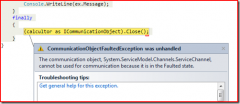Silverlight+WCF 实战-网络象棋最终篇之对战视频-下篇[客户端发
本篇继上一篇:
一: 简单原理
二: 步骤解析:
三: 具体实施
1:如何打开视频
2:Silverlight如何使用Socket进行通讯
2.1:与远程建立链接:
2.2:注册编号[这里的规则是“房间号+棋手颜色值”]
2.3:开新线程,等待接收对方视频
2.4:将视频显示出来,需要用主线程来操作
3:图片压缩与视频发送
3.1:图片压缩

因此,找一种图片压缩算法,是一种开始:
一开始:是从网上down了个PngEncoder,压缩160*160的截图后,图片大小是40K,看成是4K[因为看字节时是4后面好多0,看少了一个0],兴奋的我~~~
因此一开始在本地测试是正常的,上到网上就oh..no了。
40K*5,即每秒要发送200K的数据,这样就等于把2M/200K带宽给用光了,房东那限制的512K/56K带宽,就更提不上了~~~
最后:还是用上了大伙普通通用的JpgEncoder,压缩160*160的截图后,图片大小是10K,每秒产生10K*5=50K,56K带宽刚好够用了。
由于JpgEncoder为第三方插件,因此其代码就不贴了,下面简单介绍下:

2:JpgEncoder.cs有一静态方法,直接可以获取Stream流:
public static Stream GetStream(WriteableBitmap bitmap)
3:没了~~~
ps:具体FJ.Core.dll、JpgEncoder.cs两个文件可以从下载源码下找到。
3.2 视频发送
为了定时发送视频,我们需要开启定时器:

public MainPage()
{
InitializeComponent();
timer = new System.Windows.Threading.DispatcherTimer();
timer.Interval = TimeSpan.FromSeconds(0.2);//0.2秒一次,每秒5次
timer.Tick += new EventHandler(timer_Tick);
}
void timer_Tick(object sender, EventArgs e)
{
//这里就是发送视频的代码了
}
private void btnSend_Click(object sender, RoutedEventArgs e)
{
timer.Start();//点击发送视频时,启动定时器即可
}
在点击发送触发定时器时,发送视频

int length;
void timer_Tick(object sender, EventArgs e)
{
WriteableBitmap img = new WriteableBitmap(canVideo, null);
Stream stream = JpgEncoder.GetStream(img); //获取压缩后的流
length = (int)stream.Length;
stream.Read(content, 0, length);
stream.Close();
SocketAsyncEventArgs sendEvent = new SocketAsyncEventArgs();
sendEvent.SetBuffer(content, 0, length);
videoSocket.SendAsync(sendEvent);//这里只管发送,发送后的结果不管了。
img = null;
}
至此,客户端的一系列动作就完成了,包括[打开视频/注册编号/发送视频/接收视频],下面到服务端代码上场了。
4:控制台服务端Socket中转
4.1:额外的处理事件
虽然这里没用WCF,改用Socket方式,一样需要解决跨域问题。
第二:用Socket通讯方式,还需要开启另外的943端口监听。
不过这两步,网上都有现成的代码,直接copy就可以了。
步骤如下:
1:新建控制台项目—》起名:TCPService
2:新建类文件:PolicyServer.cs,完整代码如下,大伙直接使用就可以了:
 PolicyServer类与跨域xml文件
PolicyServer类与跨域xml文件
using System.Collections.Generic;
using System.Linq;
using System.Text;
using System.Net.Sockets;
using System.Net;
namespace TCPService
{
class PolicyServer
{
Socket m_listenerIPv4;
Socket m_listenerIPv6;
byte[] m_policy;
// pass in the path of an XML file containing the socket policy
public PolicyServer(string policyContents)
{
m_policy = Encoding.UTF8.GetBytes(policyContents);
// Create the Listening Sockets
m_listenerIPv4 = new Socket(AddressFamily.InterNetwork, SocketType.Stream, ProtocolType.Tcp);
m_listenerIPv4.Bind(new IPEndPoint(IPAddress.Any, 943));
m_listenerIPv4.Listen(10);
m_listenerIPv4.BeginAccept(new AsyncCallback(OnConnection), m_listenerIPv4);
//Console.WriteLine("Listenting on IPv4 port 943.");
if (System.Net.Sockets.Socket.OSSupportsIPv6)
{
m_listenerIPv6 = new Socket(AddressFamily.InterNetworkV6, SocketType.Stream, ProtocolType.Tcp);
m_listenerIPv6.Bind(new IPEndPoint(IPAddress.IPv6Any, 943));
m_listenerIPv6.Listen(10);
m_listenerIPv6.BeginAccept(new AsyncCallback(OnConnection), m_listenerIPv6);
//Console.WriteLine("Listenting on IPv6 port 943.");
}
else
{
// Console.WriteLine("IPv6 is not supported by the system.");
}
}
// Called when we receive a connection from a client
public void OnConnection(IAsyncResult res)
{
Socket listener = (Socket)res.AsyncState;
Socket client = null;
try
{
client = listener.EndAccept(res);
}
catch (SocketException)
{
return;
}
// handle this policy request with a PolicyConnection
PolicyConnection pc = new PolicyConnection(client, m_policy);
// look for more connections
listener.BeginAccept(new AsyncCallback(OnConnection), listener);
}
public void Close()
{
m_listenerIPv4.Close();
if (m_listenerIPv6 != null)
{
m_listenerIPv6.Close();
}
}
}
class PolicyConnection
{
Socket m_connection;
// buffer to receive the request from the client
byte[] m_buffer;
int m_received;
// the policy to return to the client
byte[] m_policy;
// the request that we're expecting from the client
static string s_policyRequestString = "<policy-file-request/>";
public PolicyConnection(Socket client, byte[] policy)
{
m_connection = client;
m_policy = policy;
m_buffer = new byte[s_policyRequestString.Length];
m_received = 0;
try
{
// receive the request from the client
m_connection.BeginReceive(m_buffer, 0, s_policyRequestString.Length, SocketFlags.None, new AsyncCallback(OnReceive), null);
}
catch (SocketException)
{
m_connection.Close();
}
}
// Called when we receive data from the client
private void OnReceive(IAsyncResult res)
{
try
{
m_received += m_connection.EndReceive(res);
// if we haven't gotten enough for a full request yet, receive again
if (m_received < s_policyRequestString.Length)
{
m_connection.BeginReceive(m_buffer, m_received, s_policyRequestString.Length - m_received, SocketFlags.None, new AsyncCallback(OnReceive), null);
return;
}
// make sure the request is valid
string request = System.Text.Encoding.UTF8.GetString(m_buffer, 0, m_received);
if (StringComparer.InvariantCultureIgnoreCase.Compare(request, s_policyRequestString) != 0)
{
m_connection.Close();
return;
}
// send the policy
m_connection.BeginSend(m_policy, 0, m_policy.Length, SocketFlags.None, new AsyncCallback(OnSend), null);
}
catch (SocketException)
{
m_connection.Close();
}
}
// called after sending the policy to the client; close the connection.
public void OnSend(IAsyncResult res)
{
try
{
m_connection.EndSend(res);
}
finally
{
m_connection.Close();
}
}
}
//跨域用的xml文件,以代码的方式传入。
public static class SocketPolicy
{
public const string Policy = @"
<xml version=""1.0"" encoding =""utf-8"">
<access-policy>
<cross-domain-access>
<policy>
<allow-from>
<domain uri=""*"" />
</allow-from>
<grant-to>
<socket-resource port=""4502-4530"" protocol=""tcp"" />
</grant-to>
</policy>
</cross-domain-access>
</access-policy>
";
}
}
3:控制台启动首行代码
{
PolicyServer ps = new PolicyServer(SocketPolicy.Policy);//Silverlight跨域访问与开启943端口
}
至此,我们添加了个额外的处理类来解决943端口和跨域问题[注意上面代码中xml的端口号配置范围哦],下面开始自己的服务端处理流程
4.2:服务端处理流程
4.2.1:开启监听

{
class Program
{
public static Dictionary<int, ThreadProxy> soketList;//房号+颜色值
static void Main(string[] args)
{
PolicyServer ps = new PolicyServer(SocketPolicy.Policy);//Silverlight跨域访问及943端口
//主线程监听
soketList = new Dictionary<int, ThreadProxy>();
Console.WriteLine("TCPService正在启动运行");
IPEndPoint ip = new IPEndPoint(IPAddress.Any, 4505);//本地任意IP及4505端口
Socket mainSocket = new Socket(AddressFamily.InterNetwork, SocketType.Stream, ProtocolType.Tcp);
mainSocket.Bind(ip);
mainSocket.Listen(-1);
while (true)
{
Socket socket = mainSocket.Accept();
new ThreadProxy(socket).Run();//收到消息即时处理。
}
}
public static void WriteLine(string msg)
{
Console.WriteLine(msg);
}
}
class ThreadProxy
{
public Socket socket;
public ThreadProxy(Socket newSocket)
{
socket = newSocket;
}
public void Run()
{
Thread thread = new Thread(new ThreadStart(Action));
thread.Start();
}
public void Action()
{
Program.WriteLine("有人来了----");
//下面开启处理逻辑
}
}
}
说明:
4.2.2 定义下全局变量

ThreadProxy youThreadProxy;//对方
bool firstConn = true;//是否第一次建立链接,首次链接都是注册编号,不发送视频的;
4.2.3 处理编号注册、移除、查找对方
编号注册:

{
firstConn = false;//注册完后,设置下标识
if (key.Length < 10)//字节太多就是图片流了
{
if (int.TryParse(key, out num))
{
if (Program.soketList.ContainsKey(num))//之前都有人在了
{
Program.soketList[num].socket.Close();
Program.soketList[num].socket.Dispose();
Program.soketList.Remove(num);
}
Program.soketList.Add(num, this);
Program.WriteLine("用户注册:" + key);
FindYouSocket();
return;
}
}
}
线程错误,编号移除:

{
if (errorProxy.socket != null)
{
errorProxy.socket.Close();
}
Console.WriteLine("删除用户:" + errorProxy.num +"错误信息:"+ errorMsg);
Program.soketList.Remove(errorProxy.num);
}
查询对方:

{
int youNum = num % 2 == 0 num - 1 : num + 1;
if (Program.soketList.ContainsKey(youNum))
{
youThreadProxy = Program.soketList[youNum];
}
}
4.2.4 主业务处理中转流程

{
socket = newSocket;
socket.SendBufferSize = buffer.Length;
socket.ReceiveBufferSize = buffer.Length;
}
public void Run()
{
Thread thread = new Thread(new ThreadStart(Action));
thread.Start();
}
public void Action()
{
Program.WriteLine("有人来了----");
try
{
while (true)
{
if (socket.Connected)
{
int length = 0, count = 0;
do
{
System.Threading.Thread.Sleep(20);//关键点,请求太快数据接收不全
length = socket.Receive(buffer, count, socket.Available, 0);
count = count + length;
}
while (socket.Available > 0);
if (count > 1)
{
if (count < 4)//小字节,命令字符
{
if (firstConn)//首次登陆,需要注册ID
{
string key = ASCIIEncoding.ASCII.GetString(buffer, 0, count);
RegSocket(key);
}
}
else if (youThreadProxy == null)
{
Program.WriteLine("没人接收。。。");
FindYouSocket();
}
else if (youThreadProxy.canReceive)//对方允许接收图片发送
{
Program.WriteLine("图片来了:" + count);
if (youThreadProxy.socket.Connected)
{
Program.WriteLine("图片转发:" + buffer.Length);
try
{
youThreadProxy.socket.Send(buffer, count, 0);
}
catch(Exception err)
{
OnError(youThreadProxy, err.Message);
}
}
}
}
}
else
{
OnError(this,"socket链接已关闭");
break;
}
}
}
catch(Exception err)
{
OnError(this,err.Message);
}
}
处理流程也很简单,根据请求的字节大小来调用是“注册”还是“中转”。
至此,整个完整的视频传输篇完成了,完成的图片和上一节一样了:
最后是大家期待已久的示例源码下载: [别忘了留下言推荐下哦^-^]
说明:视频源码中的内容会多一些,包括一开始我写的一些其它杂七杂八的代码,不过不影响整个的运行。
最后:谢谢大家对本系列的喜欢,谢谢支持~
PS:传说点一下推荐会有10个园豆,喜欢麻烦点一下“推荐”,thank you very much!!
热门源码
![[WCF安全系列]绑定、安全模式与客户端凭证类型:BasicHttpBindin](http://p1.codesocang.com/uploads/allimg/c140311/139450c5512110-N209_lit.png)

![WCF技术剖析之三十一:WCF事务编程[上篇]](http://p1.codesocang.com/uploads/allimg/c140311/139451010DKF-G030_lit.png)

![WCF服务端运行时架构体系详解[下篇]](http://p1.codesocang.com/uploads/allimg/c140311/139450cR4CF-IL3_lit.jpg)
![WCF版的PetShop之二:模块中的层次划分[提供源代码下载]](http://p1.codesocang.com/uploads/allimg/c140311/13945100T5b60-144N_lit.jpg)






